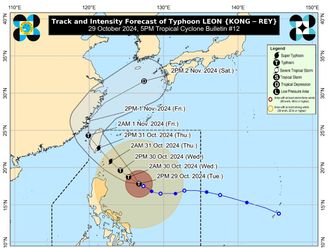Manila: Arriving passengers at Manila's Ninoy Aquino International Airport (NAIA) are to be subjected to stringent screening for bird flu with authorities raising alert levels in anticipation of the rush for the festive season.
As airport officials braced for the expected Christmas arrivals, the Presidential Palace reminded overseas workers returning to their places of work or planning to spend the holidays abroad to take the necessary precautions amid reports of avian influenza, or bid flu, in neighbouring Hong Kong.
Deputy presidential spokesperson Abigail Valte said that although a formal travel advisory has not been issued, Filipinos are advised to observe proper hygiene and avoid countries with confirmed bird flu cases.
"The usual reminders, just to keep safe and to take the necessary precautions especially if they are planning to visit places with reported similar virus," she said.
Connecting flights
It is expected that the risk of transmission and entry into the country of bird flu will increase as thousands of overseas Filipino workers return from Hong Kong or pass through the territory as they try to catch connecting flights from other countries.
Hong Kong last Friday confirmed its first case of bird flu in humans in seven years.
Jose Angel Honrado, administrator of the Manila International Airport Authority, said authorities have taken appropriate measures and also put in place necessary equipment to guard against the entry of the highly contagious and deadly disease into the country.
Honrado was quoted in radio reports as saying that the airport arrival areas had been equipped with infrared thermal imagers that can detect if a person has a fever without the need for individual checks.
Quarantine approvals
A fever or a consistently higher-than-normal body temperature is one of the symptoms of bird flu.
If an arriving passenger shows such symptoms, he or she will be examined by airport medical personnel and will be placed in quarantine until it is ascertained that the condition is not as a result of a bird flu infection.
Renewed concern over the pandemic follows reports that Hong Kong has reported its first bird flu case in seven years.
The former British colony raised its bird flu alert level to "serious" after a 59-year-old woman who returned from a visit to the Chinese mainland showed symptoms of an AH5N1 infection.
The patient was hospitalised while her 60-year-old husband, who also showed similar symptoms, has reportedly recovered.
There has been no documented cases of AH5N1 infection among humans in the Philippines, except for the one recorded in 2005 at a duck farm in Bulacan, North of Manila which involved three ducks but did not pose any health risks to humans.
According to the World Health Organisation, bird-to-human transmissions of the H5N1 virus have only been reported in Cambodia, China, Indonesia, Thailand, Turkey, and Vietnam.












